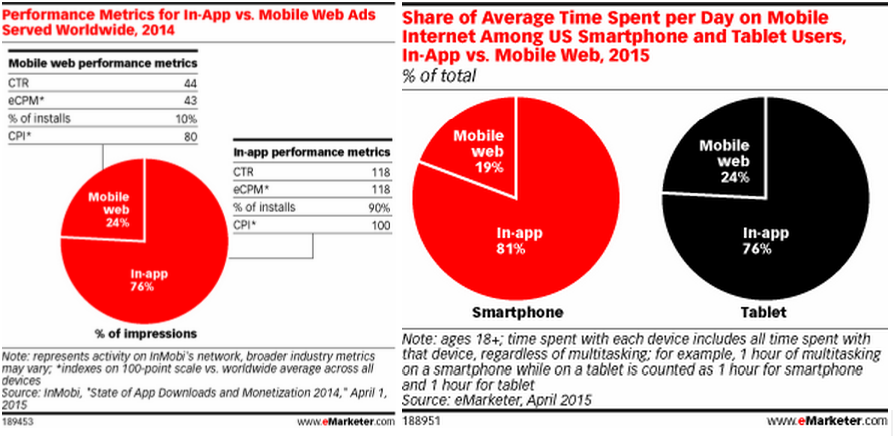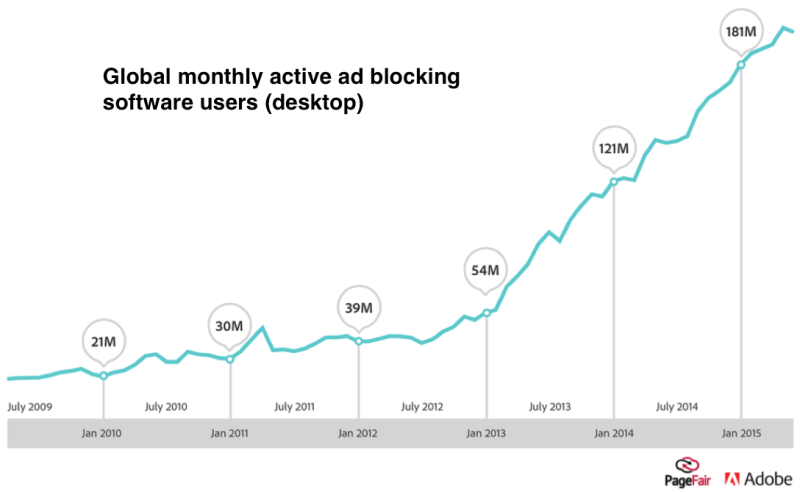Ansible and Magna Global contributed to this report.
Fast Forward is your guide to tech-driven changes in the media landscape by IPG Media Lab. A fast read for you and a forward for your clients and team.
- iOS 9 will allow ad-blocking extensions for Safari, distributed through the App Store
- Ad delivery and data tracking abilities will be impacted for a significant number of users who opt in
- Brands and publishers can adapt with native advertising or partnering with data owners that don’t rely on ad network tracking
What Happened
Important details have recently emerged about a new feature in Apple’s default web browser in iOS 9, Safari. Apple promises developers a “fast and efficient way to block cookies, images, resources, pop-ups, and other content.” That means that ads and ad-network tracking scripts will never get delivered to some portion of iOS 9 users. Recent tests removing ad-tracker javascript with a pre-release version of iOS 9 reduced page loading times by as much as 80%, from 11 seconds to 2 seconds.
How Media Owners Should Respond
- Deliver the best possible experience in a native app. Ads delivered in your app are unaffected as this only affects web ads and trackers.
- Tests of your ability to serve highly-targeted and engaging advertisements on the web have been accelerated as Apple has pushed forward the timetable.
- Integrate with Apple News and Facebook Instant Articles and others that own the user data necessary for precise targeting without hopping all over the internet to get it.
How Advertisers Should Respond
- Focus on in-app advertising, either through a network like iAd or through direct sponsorships.
- Look for more ways to integrate native advertising into your plans.
- Consider significant new investment in media properties that own enough user data that they can sufficiently target without going through an ad exchange. Seek out Facebook Instant Articles or Apple News. Google, Verizon, Yahoo and publications with niche audiences and direct ad sales are the other beneficiaries here.
Market Impact
As digital ad revenue has transitioned from desktop to mobile, most has found its way to in-app ads instead of on the web. This nearly matches attention. Whereas 81% of time spent on a smartphone is in-app, only 76% of ad spend is in-app.

We expect these new ways to block mobile web ads to more than close that gap, especially because of the importance of Safari. As the default web browser on iOS devices, Safari accounts for roughly 40% of mobile web traffic worldwide and more than half in the US.

Ad-blocking extensions are appealing to users because they can better protect their privacy, improve webpage load times, save battery life, as well as blocking the pop-ups and banner ads that disrupt basic browsing experience. Ad-blocking on the desktop is used by about 25% of users worldwide and the most popular extension for the desktop version of Safari is AdBlock.
Therefore, there is little doubt that such extensions would catch on with a significant number of users, especially when aided by the ease of App Store distribution. Ads blocked in this way on both the desktop and in the future on mobile aren’t billed to the advertiser, and will have a bigger impact on publisher revenue than on advertisers. Wide adoption could lead to a devastating impact on web publishers and ad tech providers, as an extension can shut out most ad views and cuts off the resulting ad revenues and tracking data.
We expect two main groups to be heavy adopters of these new content blockers, for different reasons. First, the higher-income, early adopter crowd is a prime candidate to incorporate these extensions, as they are more likely to know about them. Second, because content blockers have a large impact on page data size and battery life, consumers with low data caps or electricity concerns, particularly across Africa and India, are also likely to install a content-blocking extension sooner than later.
We expect the biggest tech companies and especially social networks to benefit, as they can deliver ads with sufficient targeting without relying on ad network trackers. Though Facebook’s Instant Articles has had a slow roll out, these ad-blocking extensions will accelerate publishers’ incentive to partner with Facebook. Similarly, the new Apple News is the carrot to balance the ad-blocking stick. Few other media owners can target as well as Google, Facebook and Apple, but that list includes Verizon/AOL, Yahoo, Pinterest and Twitter.
In the short term, Google’s revenue from web ads makes them unlikely to offer similar functionality in Android, but this could change if content blockers become a key selling point of iOS. Now, ad blockers are allowed on Android but are stand-alone browsers and do not integrate with Chrome, the default web browser.
For More Information
Please contact Engagement Director Samantha Holland ([email protected]) at the IPG Media Lab if you would like more detail or to schedule a visit to the Lab to discuss how the feedback loop on this could play out over the next couple years.
For previous editions of Fast Forward, please visit ipglab.com. Please reply with any constructive criticism or feedback. We want these to be as useful as possible for you and your clients, and your feedback will help us immensely.
For Additional Reading:
Paul Hudson:
This should also show you how Apple has managed to introduce content blockers without compromising on privacy: apps tell Safari the kind of content that should be blocked, but they do it indirectly and the communication only ever flows one way: apps have no knowledge of any user behavior whatsoever.
Ben Thompson:
[A]rguably the biggest takeaway should be that the chief objection to Facebook’s [Instant Articles] offer — that publishers are giving up their independence — is a red herring. Publishers are already slaves to the ad networks, and their primary decision at this point is which master — ad networks or Facebook — is preferable?
Jean-Louis Gassée:
As users, we understand that we’re not really entitled to free browsing; we pay our bills with our selves: When The Product Is Free, We Are the Product. The problem is that we feel betrayed when we find out we’ve been overpaying.
Joshua Benton:
A report from 2014 found that adblock usage was up 70 percent year-over-year, with over 140 million people blocking ads worldwide, including 41 percent of 18- to 29-year-olds.
Apple Adds Ad-Blocking Extension To iOS 9 – IPG Media Lab
Apple’s Support of Ad Blocking May Upend How the Web Works – Wired
Safari Content Blocker, Before and After – Daring Fireball
Ad Tech Is Killing The Online Experience – The Guardian

